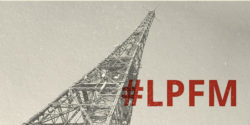Most press coverage of low-power FM focuses on particular stations, or the flourishing of the medium in the last half-decade. Not unexpectedly, rarely do articles delve into the deep history, which goes all the way back to 1948, with mileposts in the 1960s, 70s, 80s and 90s, leading up the FCC’s eventual creation of the modern LPFM service in 2000.
That’s why I read with great pleasure journalist Glenn Daigon’s well-researched and reported piece for Who.What.Why, “In Big Media Era, Some Communities Turn to Alternative: Low Power Radio.” Daigon lays out the medium’s timeline clearly, beginning with the creation of its predecessor, Class D FM, in the post-war period, to the neglect the license class experienced in the 60s and 70s, on to the FCC killing the service in 1978, at the behest of public radio leaders.
This is a history I know well because I researched and wrote about it for a chapter in the 2001 anthology Radio Reader: Essays in the Cultural History of Radio. To the best of my knowledge, it was a story that was largely undocumented – at least not in a single narrative – prior to this publication.
Daigon also properly cites unlicensed pirate and micropower radio as an important source of pressure on the FCC in the 1990s, leading to the creation of the current LPFM service. Activists took direct action with their own low-powered unlicensed stations to protest both the rapid consolidation and homogenization of the radio dial brought on by the Telecommunications Act of 1996, and the fact that the Commission – with no technical argument to support it – refused to license any broadcaster under 100 watts.
(Hear more about this broadcast civil disobedience in podcast episode #34 – How the Telecom Act of ’96 Triggered Popular Resistance.)
Noting the successful launch of more than 1400 low-power FMs in the last two decades, Daigon briefly profiles the efforts of great stations like ArtxFM in Louisville, KY.
This is perhaps one of the best and most concise histories of low-power FM I’ve encountered, and a must-read for anyone who volunteers at or listens to a LPFM station.



